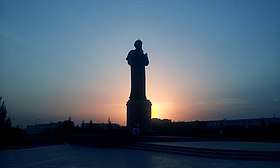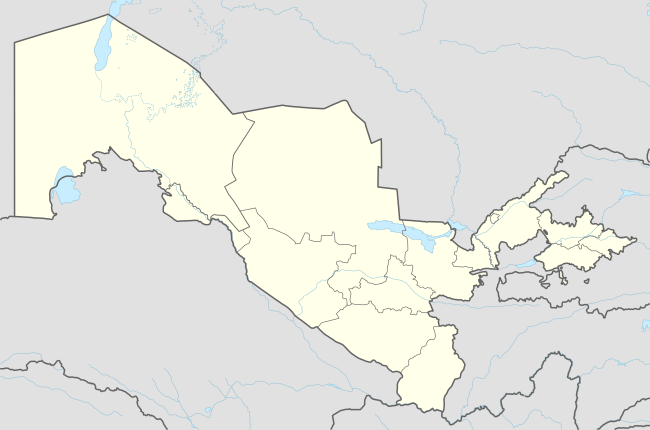Navoiy
Navoiy, also spelled as Navoi is a city and the capital of Navoiy Region in the southwestern part of Uzbekistan. It is located at latitude 40° 5' 4N; longitude 65° 22' 45E, at an altitude of 382 meters. The city is named after Ali-Shir Nava'i.
Navoiy | |
|---|---|
 | |
 Navoiy Location in Uzbekistan | |
| Coordinates: 40°05′04″N 65°22′45″E | |
| Country | |
| Region | Navoiy Region |
| District | Navoiy District |
| City status | September 3, 1958 |
| Government | |
| • Hokim (mayor) | Bahodir Juraev |
| Area | |
| • Total | 35 km2 (14 sq mi) |
| Elevation | 382 m (1,253 ft) |
| Population (2014) | |
| • Total | 134,100 |
| • Density | 3,800/km2 (9,900/sq mi) |
| Postal Code | 210100 – 210109 |
| Area code(s) | +998-79 |
| Website | www |
As of the 2007 census, its population was 125,800 inhabitants.[1]
History
Originally known as Kermine (or Karmana) under the Emirate of Bukhara, the city was re-founded in 1958, under the name of the great Uzbek poet and statesman Alisher Navoi, who wrote in Persian and Chaghatai at the court of Emir Husein Boykara (or Husayn Bayqaro) in Herat.
Economy
Navoiy Region has large stocks of natural gas and deposits of precious metals, as well as large stocks of raw materials for production of construction materials. Among enterprises there are Navoi and Zarafshan Gold Mining and Metallurgical Complexes, which extract one of the purest golds in the world. The enterprise NavoiyAzot is the largest producer of mineral fertilizers in the country.
Navoiy Free Industrial Economic Zone (FIEZ)
The Navoi Free Industrial Economic Zone (FIEZ) with special conditions for foreign investments was created in Navoi Region of Uzbekistan, nearby Navoi International Airport. It is due to operate for 30 years.
Businesses in FIEZ enjoy favourable customs, currency and tax regulations and simplified procedures for entry, stay and obtaining of work permit for non-resident citizens. They are exempt from taxes for a period depending on the amount of direct investments:
- from 3 to 10 million dollars – for 7 years;
- from 10 to 30 million dollars – for 10 years, with reduction of profit and unified tax payment rates by 50% in the next 5 years;
- more than 30 million dollars – for 15 years, with reduction of profit and unified tax payment rates by 50% in the next 10 years.
- Along with this, business entities will be exempted from paying customs duties (excluding charges for customs clearance) for equipment, raw materials and components imported for the production of export oriented goods. They will be able to make payments in foreign currency within the FIEZ, as well as to use convenient terms of payments for exported and imported goods.
Management of the FIEZ will be by an Administrative Council which may select an international company to manage the zone on a contract basis. A FIEZ development fund aimed to support infrastructure development is also planned.
13 joint ventures operate in Navoi FIEZ which produce car components, ADSL modems, LED lamps, cosmetics, diapers, and other products.[2]
Transportation
The Zone will be located at a distance of 800 meters from the highway E-40, 1,8 km from the cargo terminal of Navoiy Airport, connected to international railway routes towards countries of Europe (via Russia), South Asia (via China), Middle East and the Gulf (via Iran). The distance to the nearest water and gas distribution centres is 800 m, electrical station – 8 km.
Climate
| Climate data for Navoiy (1981–2010) | |||||||||||||
|---|---|---|---|---|---|---|---|---|---|---|---|---|---|
| Month | Jan | Feb | Mar | Apr | May | Jun | Jul | Aug | Sep | Oct | Nov | Dec | Year |
| Average high °C (°F) | 6.8 (44.2) |
10.0 (50.0) |
15.8 (60.4) |
23.5 (74.3) |
29.0 (84.2) |
34.7 (94.5) |
36.2 (97.2) |
35.0 (95.0) |
29.6 (85.3) |
22.6 (72.7) |
15.7 (60.3) |
9.1 (48.4) |
22.3 (72.2) |
| Average low °C (°F) | −1.2 (29.8) |
0.3 (32.5) |
4.7 (40.5) |
10.5 (50.9) |
14.7 (58.5) |
18.7 (65.7) |
20.4 (68.7) |
18.2 (64.8) |
12.6 (54.7) |
7.2 (45.0) |
3.7 (38.7) |
0.3 (32.5) |
9.2 (48.5) |
| Average precipitation mm (inches) | 28.1 (1.11) |
28.6 (1.13) |
40.9 (1.61) |
25.9 (1.02) |
16.0 (0.63) |
1.7 (0.07) |
1.8 (0.07) |
0.5 (0.02) |
1.8 (0.07) |
3.6 (0.14) |
17.7 (0.70) |
27.3 (1.07) |
193.9 (7.64) |
| Average precipitation days | 10 | 10 | 10 | 8 | 6 | 2 | 1 | 1 | 1 | 4 | 7 | 8 | 68 |
| Source: Centre of Hydrometeorological Service of Uzbekistan[3] | |||||||||||||
References
- Official Website of Navoiy Region
- "Navoi Free Industrial Economic Zone". Retrieved 30 June 2014.
- "Average monthly data about air temperature and precipitation in 13 regional centers of the Republic of Uzbekistan over period from 1981 to 2010". Centre of Hydrometeorological Service of the Republic of Uzbekistan (Uzhydromet). Archived from the original on 15 December 2019. Retrieved 15 December 2019.
External links
| Wikimedia Commons has media related to Navoiy. |
- Official website (in Uzbek)
- Official website (in Russian)
- Gov.uz
- NGMK.uz